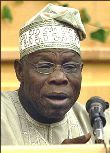Nigeria plans mission to Darfur as Sudan pledges to restore peace
 ABUJA, Aug 17 (AFP) — Nigeria’s President Olusegun Obasanjo called for lawmakers to approve the deployment of up to 1,500 peacekeeping troops to Sudan’s war-torn province of Darfur, as Khartoum pledged to restore order there.
ABUJA, Aug 17 (AFP) — Nigeria’s President Olusegun Obasanjo called for lawmakers to approve the deployment of up to 1,500 peacekeeping troops to Sudan’s war-torn province of Darfur, as Khartoum pledged to restore order there.
But the full scale and precise mission of the African Union mission to Sudan’s troubled western region remained unclear, six days ahead of peace talks in Abuja between the government and Darfur’s rebel movements.
In a letter to the Nigerian senate, Obasanjo asked for the green light to initially send a 150-man company to protect African Union observers, while retaining an option on sending up to two 770-strong battalions.
And Sudan’s Foreign Minister Mustafa Osman Ismail told reporters that while Khartoum welcomed the African support, it intends to take the lead in restoring stability in Darfur and is to increase its own police presence there.
“I’m hereby requesting approval to meet the request of the African Union to supply one company of Nigerian troops as part of the AU protection force in Darfur,” Obasanjo said in a letter read to senators.
“This approval should equally make allowance for the Nigerian contribution to be expanded as may be necessary to one battalion, but not be more than two battalions at the utmost,” he added.
Officials had previously said that Nigerian vanguard company will link up this weekend with 150 Rwandan troops already in Sudan. The force could then expand to 2,000 troops with the addition of a battalion from each company.
Sudan’s government has been accused of triggering a humanitarian crisis by arming a brutal militia, known as the Janjaweed, and sending it to attack civilian communities with suspected rebel sympathies.
The United Nations reports that up to 50,000 people may have been killed and one million more put at risk of starvation or ethnic violence in the past year.
Nigeria warned last week that if Sudan did not accept the African peace plan it would have to face tougher action from outside the continent, while the UN Security Council has threatened as yet unspecified sanctions.
But Ismail told reporters in Abuja that his government wanted to take the lead in restoring order to its own province.
“The war in Darfur, we never started it. It was imposed on us by the rebels who should be held responsible for all the negative impacts,” he said, six days before Abuja is due to host a Darfur peace conference.
“But at the same time, we believe that the government has a responsibility to restore law, order and security,” he added.
“Now we’ve about 40,000 troops — army soldiers — in Darfur plus about 10,000 police and we’re going to increase the police up to maybe 20,000.”
Ismail did, however, go further than any senior Sudanese official had gone previously in acknowledging the scale of the problem.
“The total of those who are vulnerable and been affected by the war is about one million,” he said, explaining that not all of those at risk had fled to refugee camps but that some were still living in exposed villages.
Ismail asked Obasanjo, host of Monday’s peace conference and chairman of the African Union, for trucks, planes, food and the immediate deployment of the initial batch of 150 Nigerian troops.
The minister said that he had conveyed to Obasanjo the “commitment and readiness” of the Sudanese government to participate in Monday’s talks, to which Darfur’s rebel leaders have also been invited.
“Our wish is that the talks will lead us to a final, fair and justifiable resolution of the problem,” he said.
Obasanjo said: “The meeting of August 23 is very important.
“Dealing seriously with the issue of disarmament will help the process. After disarmament and demobilisation, we must think of reintegrating the rebels and various militia back into civil society,” he added.
“Then, we must find a political solution to a political problem,” he said.
Ismail is due to leave Nigeria for Chad later Tuesday, after meeting on Monday with Libyan leader Moamer Kadhafi, officials said. Chad has a long border with Darfur and have received tens of thousands of refugees.
